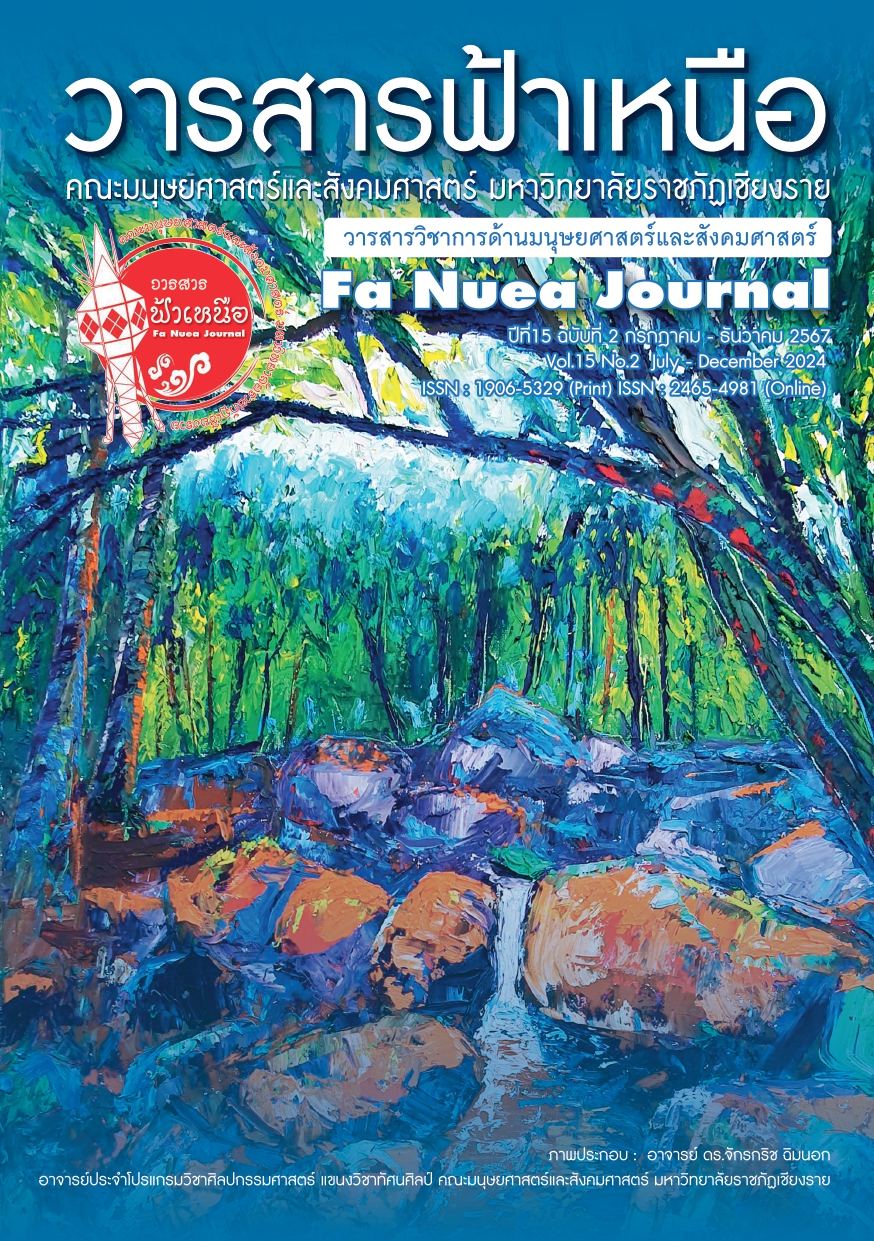การศึกษาปัญหาคำศัพท์ในการเขียนเชิงวิชาการของนักศึกษาระดับบัณฑิตศึกษา
Main Article Content
บทคัดย่อ
คำศัพท์มีบทบาทสำคัญอย่างยิ่งในการเรียนรู้ภาษาอังกฤษและมีความจำเป็นอย่างมากในการเขียนเชิงวิชาการ อย่างไรก็ตาม นักศึกษาระดับบัณฑิตศึกษามักประสบปัญหาในการใช้คำศัพท์ในการเขียนบทความวิชาการ การวิจัยเชิงปริมาณนี้จึงมีวัตถุประสงค์เพื่อศึกษาปัญหาด้านคำศัพท์ที่นักศึกษาระดับบัณฑิตศึกษาประสบในการเขียนบทความวิชาการของนักศึกษาระดับบัณฑิตศึกษาจำนวน 23 คน ซึ่งคัดเลือกโดยการสุ่มตัวอย่างแบบเจาะจง เครื่องมือในการวิจัย ได้แก่ แบบสอบถามที่พัฒนาขึ้นจากกรอบความรู้ด้านคำศัพท์ของ Nation (2005) ในการประเมินระดับความคิดเห็นเกี่ยวกับปัญหาในด้านคำศัพท์ และวิเคราะห์ข้อมูลโดยใช้ค่าเฉลี่ย และส่วนเบี่ยงเบนมาตรฐาน ผลการวิจัยพบว่าผู้เข้าร่วมการวิจัยประสบปัญหาในหลายมิติของความรู้คำศัพท์ โดยมีค่าเฉลี่ยของระดับความคิดเห็นรวม 4.01 (เห็นด้วย) ซึ่งปัญหาที่พบมาก คือ คำที่มีหลายความหมาย (ค่าเฉลี่ย 4.17) และคำที่มีความหมายแตกต่างกันในบริบทต่าง ๆ (ค่าเฉลี่ย 4.13) รวมถึงความวิตกกังวลในการเขียน (ค่าเฉลี่ย 3.91) ผลการวิจัยยืนยันว่าคำศัพท์ยังคงเป็นเรื่องท้าทายที่สำคัญในการเขียนเชิงวิชาการสำหรับนักศึกษาระดับบัณฑิตศึกษา นอกจากนี้ การศึกษานี้ยังชี้ให้ เห็นถึงความจำเป็นในการสอนคำศัพท์เฉพาะทางและกลยุทธ์ เพื่อลดความวิตกกังวลในการเขียนเชิงวิชาการ
Article Details

อนุญาตภายใต้เงื่อนไข Creative Commons Attribution-NonCommercial-NoDerivatives 4.0 International License.
เนื้อหาและข้อมูลในบทความที่ลงตีพิมพ์ในวารสารฟ้าเหนือระบบ ThaiJO2 ถือเป็นข้อคิดเห็นและความรับผิดชอบของบทความโดยตรงซึ่งกองบรรณาธิการวารสารไม่จำเป็นต้องเห็นด้วยหรือร่วมรับผิดชอบใด ๆ
บทความ ข้อมูล เนื้อหา รูปภาพ ฯลฯ ที่ได้รับการตีพิมพ์ในวารสารฟ้าเหนือระบบ ThaiJO2 ถือเป็นลิขสิทธิ์ของ วารสารฟ้าเหนือระบบ ThaiJO2 หากบุคคลหรือหน่วยงานใดต้องการนำทั้งหมดหรือส่วนหนึ่งส่วนใดไปเผยแพร่ต่อ หรือเพื่อกระทำการใดๆจะต้องได้รับอนุญาตเป็นลายลักษณ์อักษรจากวารสารฟ้าเหนือระบบ ThaiJO2 ก่อนเท่านั้น
เอกสารอ้างอิง
Alharbi, N. S. M. (2017). An investigation into the academic writing: Difficulties of Saudi postgraduate students. [Doctoral dissertation, The University of Exeter.] University of Exeter Repository. http://hdl.handle.net/10871/33113
Al-Khairy, M. A. (2013). Saudi English-major undergraduates' academic writing problems: A Taif University perspective. English Language Teaching, 6(6), 1-8. https://doi.org/10.5539/elt.v6n6p1
Al-Khasawneh, F. M. S. (2010). Writing for academic purposes: Problems faced by Arab postgraduate students of the College of Business, UUM. ESP World, 9(2), 1-23. http://www.esp-world.infor
Al Qunayeer, H. S. (2021). An investigation of the Relationship between reading comprehension, vocabulary Knowledge, and English language proficiency level of Saudi EFL learners. Advances in Language and Literary Studies, 12(2), 59-69. https://doi.org/10.7575/aiac.alls.v.12n.2.p.59
Asaad, H. Q. M. (2024). The role of morphological awareness in L2 postgraduates’ academic writing: is vocabulary knowledge a mediating variable?. Cogent Education, 11(1), 2327787. https://doi.org/10.1080/2331186X.2024.2327787
Asnas, S. A. M., & Hidayanti, I. (2024). Uncovering EFL students’ frequent difficulties in academic writing and the coping strategies: The case of a college in Indonesia. Journal on English as a Foreign Language, 14(1), 124- 151. https://doi.org/10.23971/jefl.v14i1.7472
Basir, H., Abdullah, E., & Zaiyadi, Z. A. (2015). Lexical errors in English for academic purposes (EAP) students’ essays. In W. N. H. b. W. Ramli, N. S. b. Awaludin, N. N. b. Nordin, N. b. Zainudin, & W. S. S. b. Shahar (Ed.), Management and Muamalah. 2nd International Conference 2015 (2ndICoMM) (pp. 357-361). https://conference.uis.edu.my/icomm/2nd/download/IC%20032.pdf
Çelik, S. (2020). Building critical academic writing skills: The impact of instructor feedback on Turkish ELT graduate students. The Electronic Journal for English as a Second Language, 24(3), 1-12. https://eric.ed.gov/?id=EJ1275864
Coady, J. (1993). Research on ESL/EFL vocabulary acquisition: Putting it in context. In T. Huckin, M. Haynes, & J. Coady (Eds.), Second language reading and vocabulary learning, (pp. 3-23). Ablex.
Coxhead, A. (2012). Academic vocabulary, writing and English for academic purposes: Perspectives from second language learners. RELC Journal, 43(1), 137-145. https://doi.org/10.1177/0033688212439323
Ellis, G., and Sinclair, B. (1989). Learning to learn English: A course in learner training. Cambridge University Press.
Evans, S., & Morrison, B. (2011). The first term at university: Implications for EAP. ELT Journal, 65(4), 387-397. https://doi.org/10.1093/elt/ccq072
Firda, I.N., Azkiyah, I. & Albiansyah. (2021). Testing breadth and depth of vocabulary Knowledge and their relationship with vocabulary size of EFL students. Journal of English Teaching, 7(1), 89-100. https://doi.org/10.33541/jet.v7i1.2434
Geng, F., & Yu, S. (2024). Exploring doctoral students’ emotions in feedback on academic writing: a critical incident perspective. Studies in Continuing Education, 46(1), 1-19. https://doi.org/10.1080/0158037X.2022.2109616
Lusta, A. F. (2012). The vocabulary problems in the academic writing of MA ELT Libyan students at Nottingham Trent University [Master’s thesis, Nottingham Trent University]. Nottingham Trent University. https://files.eric.ed.gov/fulltext/ED589767.pdf
Ibrahim, N., & Nambiar, R. M. (2011). Writing in foreign lands: The case of postgraduate international students and the introductory sections of a project paper. Procedia-Social and Behavioral Sciences, 18, 626-632. https://doi.org/10.1016/j.sbspro.2011.05.092
Maharani, R., Hakiki, S. S., & Safitri, S. (2023). Students’ problems in writing academic article: A case study in academic writing class. English Education: Jurnal Tadris Bahasa Inggris, 16(2), 219-237. http://dx.doi.org/10.24042/ee-jtbi.v16i2.17434
Mutlu, G. (2013). An analysis of lexical errors of Turkish University students learning English. In B. Ç. Başaran, B. C. Cengiz, F. Gümüşok, & D. F. Şafak (Ed.), Linguistics and language teaching. 9th International METU Postgraduate Conference, (pp. 189-205). https://www.researchgate.net/publication/318727365
Nagy, W., & Townsend, D. (2012). Words as tools: Learning academic vocabulary as language acquisition. Reading Research Quarterly, 47(1), 91-108. https://doi.org/10.1002/RRQ.011
Nation, I. S. P. (2005). Teaching and learning vocabulary. In E. Hinkel (Ed.), Handbook of research in second language teaching and learning, (pp. 581-595). Routledge.
Ooi, D., & Kim-Seoh, J. L. (1996). Vocabulary teaching: Looking behind the word. ELT Journal, 50(1), 52-58. https://doi.org/10.1093/elt/50.1.52
Phan, T. T. Q. (2023). EFL students’ perceptions towards cooperative learning in writing skills at a University in the Mekong Delta. International Journal of Language Instruction, 2(3), 48–62. https://doi.org/10.54855/ijli.23232
Qian, D. D. (2002). Investigating the relationship between vocabulary knowledge and academic reading performance: An assessment perspective. Language learning, 52(3), 513-536. https://doi.org/10.1111/1467-9922.00193
Richards, J. C. (1976). The role of vocabulary teaching. TESOL Quarterly, 10(1), 77-89. https://doi.org/10.2307/3585941
Rohmah, N., & Muslim, A. B. (2021). Writing anxiety in academic writing practice. In Y. Wirza, I. L. Damayanti, W. Gunawan, E. D. A. Imperiani, A. A. Danuwijaya, & L. Hakim, (Ed.). Applied linguistics. Proceedings of the Thirteenth Conference (CONAPLIN 2020) (pp. 348-354). 10.2991/assehr.k.210427.053
Saengpakdeejit, R. (2014). Awareness of vocabulary learning strategies among EFL students in Khon Kaen University. Theory and Practice in Language Studies, 4(6), 1101-1108. https://doi.org/10.4304/tpls.4.6.1101-1108
Sclove, S. L. (2001, n.d.). Notes on Likert Scales. http://www.uic.edu/classes/idsc/ids270sls/likert.htm
Taylor, L. (1990). Teaching and learning vocabulary (1st ed.). Prentice Hall.
Taylor, L. (1992). Vocabulary in action (1st ed.). Prentice Hall.
Ur, P. (1996). A Course in English language teaching (1st ed.). Cambridge University Press.
Zhao, J. (2017). Native speaker advantage in academic writing? Conjunctive realizations in EAP writing by four groups of writers. Ampersand, 4, 47-57. https://doi.org/10.1016/j.amper.2017.07.001


